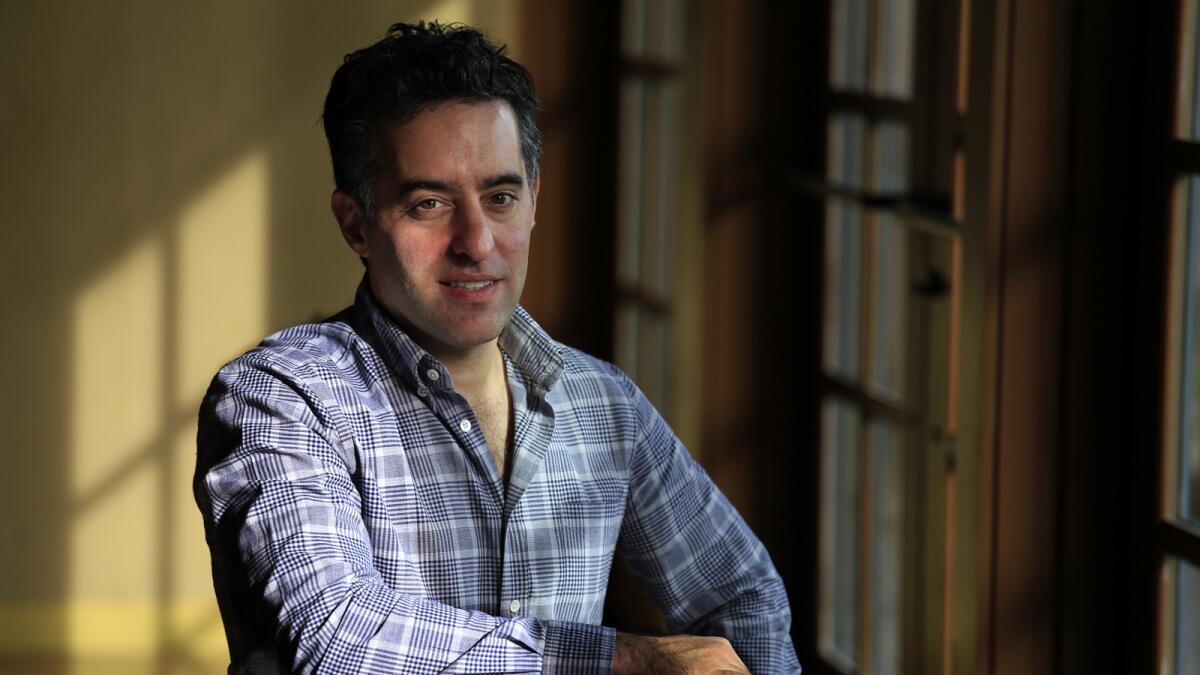Q&A: Writer Nathan Englander’s avenging pen

- Share via
Nathan Englander was in college when he first heard the story of Stalin’s 1952 purge of Russia’s top Yiddish writers. Determined that their story not die with them, he fictionalized their plight in “The Twenty-Seventh Man,” the short story that led his 1999 award-winning debut collection, “For the Relief of Unbearable Urges.” Soon came a novel and the next short story collection, “What We Talk About When We Talk About Anne Frank,” a finalist for the 2013 Pulitzer.
But he never set aside “The Twenty-Seventh Man.” It took many years and some serious editing by the late Nora Ephron to turn that story into a play, now onstage at San Diego’s Old Globe Theatre.
Let’s go back to when you first learned about “The Night of the Murdered Poets.”
It was in 1989, and one of my teachers, an expert on Russia, mentioned offhandedly these Yiddish writers being rounded up by Stalin and murdered. I was 19, dreaming about becoming a writer. I became obsessed with the idea that someone could silence and erase these writers. I felt they deserved a story.
So you sat down and wrote one?
Not exactly. I waited for years for someone else to tell their story, then decided I had to do it. I’d chosen to dedicate my life to writing, and I asked myself, “if you write your whole life, and nobody ever sees a word, is it as a writer that you die?”
That sounds like a question your fictional 27th man, Pinchas Pelovitz, an unknown and unpublished writer cast with the 26 Soviet masters, might ask.
Yes, that concern was absolutely the inspiration for Pinchas. Here he is, someone who has worked in secret and dedicated his whole life to his craft, and only when he’s thrown in with the great legends of the time does he understand he’s always been a writer.
Much of your writing has the syntax and cadence of another time. Even stories set in the present echo Talmudic questions and conflicts. Yet you were raised in Long Island in a family you’ve described as “Mayflower Jews.”
I am a fifth-generation American, but from a young age, I went to yeshiva. I spent 12 hours a day with rabbis, and I think in Yiddish. To this day, I have to go back and unravel my writing and polish it so everyone doesn’t sound like an old Jewish woman.
Do you think of this as a Jewish story?
It’s so easy to call something a Jewish story or a gay story or a woman’s story. Aesthetically, if a story is not universal, it has failed. Your obligation is to the story. One rule creatively, and emotionally, is its universality. Most of the stories I love are written by people long dead in languages I can’t speak. If it is not universal, it is not doing its job as story.
The plight of these writers more than half a century ago has so many contemporary resonances.
I wish the notion of being silenced for your beliefs were not at issue anymore. The language switches out from Yiddish, but unfortunately these themes are sadly current on so many fronts. People are speaking truth to power and being punished for it.
How did “The Twenty-Seventh Man” become a play?
Nora Ephron had read the story and invited me to lunch to talk about optioning it. She said she felt it should be a play and wanted me to write it. I said I wanted to write my novel first, and she said, “I’m here.” When I surfaced 10 years later, we set to work. She’d have me over, we’d eat bagels and lox, and she’d brutalize the script for a while. We worked on it for more than a year, and then she sent it to the Public Theater (where it was produced in 2012).
As someone who cares about these writers and their memories, I wanted to see them be alive again. It’s weird for me to have a private battle with Stalin, but he shouldn’t get to win. They shouldn’t be erased. I like that in 2015, they will be walking around in San Diego.
How has writing a play changed the way you write stories?
When I wrote my novel, “The Ministry of Special Cases,” I couldn’t even brush my teeth. I had to write in isolation from everything else. I thought a play would take away from my fiction, but the more projects I work on, the more time I have. To write plays, I had to re-learn the rules of drama — timing, reality, what’s funny, what’s sad — and I brought all that back to my fiction.
What are you working on now?
I’m halfway through a novel and halfway through a new collection of stories. I’m also working on a play for Lincoln Center Theater of my Anne Frank short story. People ask, “Why the theater?” I’m living in New York City, supporting my family with short fiction. I tell them I got tired of living on easy street, and I asked what takes longer and pays worse. Everyone said the theater, and I was bitten.
More to Read
The biggest entertainment stories
Get our big stories about Hollywood, film, television, music, arts, culture and more right in your inbox as soon as they publish.
You may occasionally receive promotional content from the Los Angeles Times.










